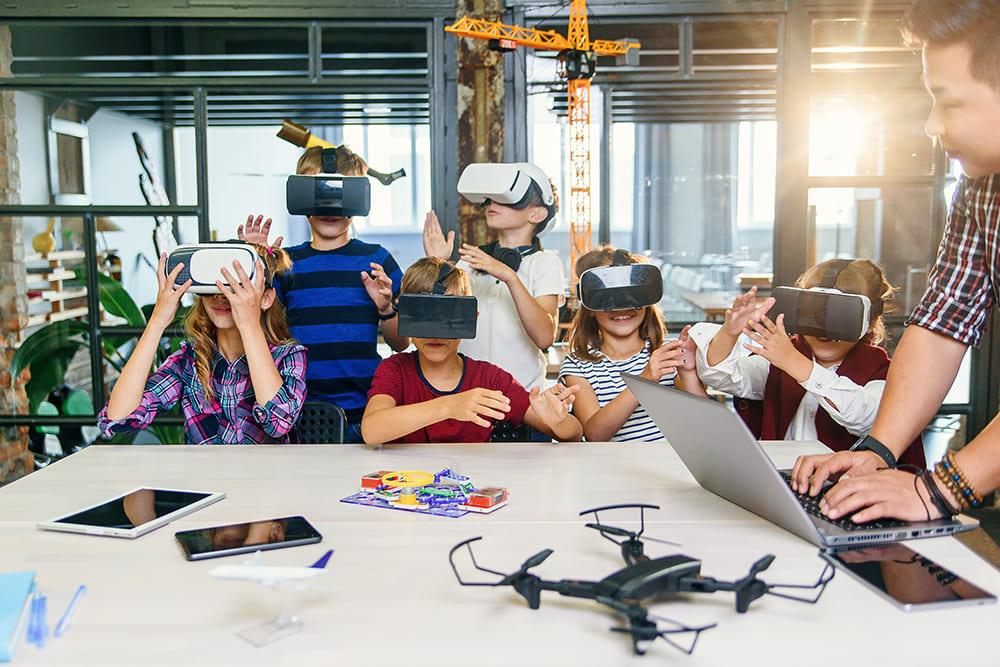To most people, virtual reality headsets remain just a fad, no matter how much big tech tries to say otherwise. We’re fairly certain most of us have never actually used one, let alone owned one. It’s a developing technology, sure, but you could have said the same about the internet just a few decades ago.
So how will VR impact entertainment as we know it? Some seem to think so. And it’s certainly beginning to leave a bigger print all over the world. Let’s consider some ways in which VR can be used for entertainment, and if it will end up being a revolution or just another gadget-based gimmick.
New VR Trends
Before we dive in, we’ll have to point out some new and interesting ways in which VR is being used. Video games and movies are old news at this point, but the trend didn’t end there.
The most obvious one is Meta. Rather infamously, Facebook decided to focus its considerable efforts towards a second-life type VR social media platform. This garnered more skepticism than optimism. Social media relies on attracting huge audiences, and VR headsets remain a rather flawed and niche product. According to Meta, though, they’re aware of the current issues but just want to be behind the curve.
They’re also running some experiments with how this new media can be used for online entertainment. The most famous is the Foo Fighters concert after the 2022 Super Bowl. The outcome was a spectacular disaster, which doesn’t exactly bode well for the future of Meta.
Another interesting instance we came across is the emergence of VR casino gaming. These days, you can even play blackjack online through the immersive medium of Virtual Reality. Such ideas are still in their infancy, though, but experts believe that they’re going to expand rapidly.
VR Problems and How to Overcome Them
Virtual reality is an old Sci-Fi concept, and we’re not surprised that it’s gaining momentum as quickly as it is. However, the technical limitations of today’s VR equipment are the first pitfall of most ambitious projects.
For starters, VR glasses are still quite expensive. Most people are not lining up to dish out hundreds of dollars for a piece of gear with very limited use. In short, most of the VR entertainment forms we’re talking about are still young and small. You don’t have many video games to play on VR yet. The ones available are still small, relatively simple, and generally pale when compared to what the industry can offer good old monitors.
And that’s widout even getting into the side effects of using VR. We’re mainly referring to the headaches, nausea, and eye pain many users are complaining about. Overcoming these problems is easier said than done. The lack of content and the graphical fidelity can believably be improved with time. The eye strain, however, is a bigger obstacle. It’s caused by the eye focusing on objects that are apparently far away, but are in reality just in front of your eye. Unless we can figure out how to make our eyes work better, VR development seems to be at an impasse.
Media, New and Old
For now, most ideas on how VR is used in entertainment are based on tried-and-true concepts.
For example, watching sports events may become an interesting experience if combined with virtual reality. Even more fascinating is the way some athletes train using VR, but that’s a topic for another day.
In the same vein, performative arts and visiting experiences can also be brought to wider audiences. Virtual reality and live theater are already being experimented with. However, both Meta and these theaters have higher aspirations than just being gimmicks.
Watching old forms of entertainment through VR glasses is all fine and dandy, but it brings up a more important question. Is Virtual Reality merely a slightly different way to watch the same old media? If that were true, VR is no different than, say, 3D movies. It’s just been updated with a more modern twist.
However, it’s quite clear that the fate of 3D cinema is one VR will want to avoid. Unless VR can figure out ways in which the medium of virtual reality actually impacts the experience and molds it, it will forever be consigned to being just a gadget.
Think of it this way: a football game is a football game, and VR is certainly not a core part of watching one. Sure, using a VR set to watch a football game may offer a new twist on how you perceive it. But the actual match is still the same for everyone watching. What is needed is an experience built as a VR one from the ground up. Video games and casinos appear to be the only ones actually doing this, but the results have been rather rudimentary so far.

“Professional web ninja. Certified gamer. Avid zombie geek. Hipster-friendly baconaholic.”








